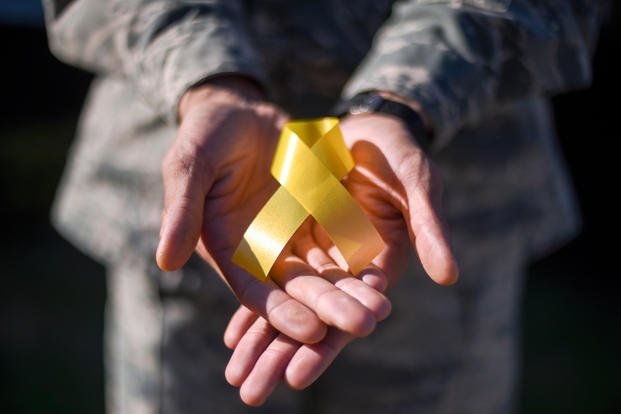The U.S. Air Force says 137 airmen across the active duty, Guard and Reserve died by suicide in 2019, a 33% increase over the previous year.
Officials confirmed the number last week after the latest statistics appeared on social media.
"Suicide is a difficult national problem without easily identifiable solutions that has the full attention of leadership," said Lt. Gen. Brian Kelly, deputy chief of staff for manpower, personnel and services for the Air Force.
"The Department of the Air Force has been and continues to pursue immediate, mid-term, and long-range suicide prevention initiatives for the total force that focus on connections between individuals, units, and Air Force family; protections in environments, services, and policies; detection of risk in individuals and units; and equipping the total force and family members to mitigate risk and increase resilience," he said in a statement provided to Military.com on Monday.
Related: Air Force Top Enlisted Leader: Keep Asking Fellow Airmen How They're Doing
Leaked slides posted on the popular but unofficial Air Force Facebook page Amn/Nco/Snco last week showed that the majority of the 2019 deaths were in the active-duty ranks -- 84 total. The slides noted that, as of Dec. 31, 68 of the 84 deaths were suspected suicides but had not been confirmed.
While the Air Force did not break down the 137 number, a spokesperson confirmed that the slides "were accurate at the time they were created."
The new total marks the highest annual number since the Air Force began keeping an official record in 2008, said service spokeswoman Lynn Kirby.
While data was not immediately available regarding suicides across the Guard and Reserve component, the previous highest year for suicides among active-duty airmen was in 2017, with 63 confirmed deaths.
According to the Department of Defense quarterly suicide report, 60 active-duty airmen died by suicide in 2018. The service lost 103 airmen across the total force that year.
The Air Force had already surpassed the number of suicides in all of 2018 by nearly 30 people on Aug. 1, 2019, officials said at the time. That month, officials ordered a "tactical pause" in operations to address the issue.
"Our teammates are taking their own lives," Chief Master Sergeant of the Air Force Kaleth O. Wright announced in a video, which was posted on social media and directed commanders to address the rise in suicides across the force. "We lose more airmen to suicide than any other single enemy."
Wright said 78 airmen had taken their lives between Jan. 1 and July 31, 2019.
Speaking to Military.com in October, the chief said that, over the course of his career, he has heard feedback from airmen who felt the most hopeless during deployments, unable to connect with someone from their unit or loved ones back home. But it was a person -- not a program or initiative -- who stepped in that made them reverse course before it was too late, he said.
"That's all it was -- meaningful connections," Wright said.
On those occasions, help came from a friend or teammate -- sometimes even a stranger -- asking the simplest questions such as, "How are you? Is there anything I can do?" he explained.
"It makes a big difference if you walk into a work center where you feel like, 'Hey, I'm a valued member of his team, and my supervisor, my teammates, they care about the things that I'm going through' versus, 'Hey, nobody cares,'" Wright said. "This is about making airmen feel valued."
If you or someone you know needs help, the Veterans Crisis Hotline is staffed 24 hours a day, seven days a week, at 800-273-8255, press 1. Services also are available online at www.veteranscrisisline.net or by text, 838255.
-- Oriana Pawlyk can be reached at oriana.pawlyk@military.com. Follow her on Twitter at @Oriana0214.
Read more: Still Misunderstood: How Traumatic Brain Injuries Affect America's Veterans













